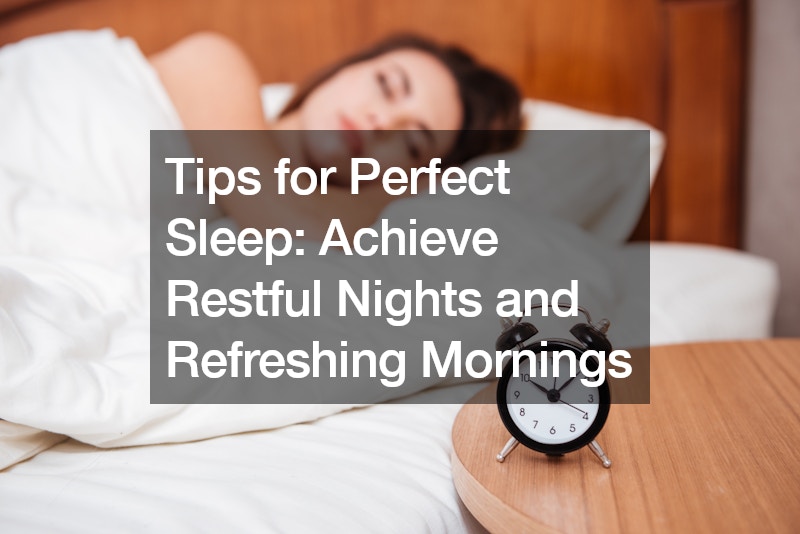Having trouble sleeping and waking up tired despite being in bed for several hours is a great disservice to the human body. Other than messing up with moods, it predisposes one to health issues such as dementia, heart disease, obesity, and Type 2 diabetes, among others. Intermittent sleeping, persistent insomnia, tossing and turning all night long is not an ideal sleeping pattern for anyone, especially since this tends to increase as one gets older. Getting perfect sleep is vital for longevity and a healthy lifestyle. Try following these nine tips for achieving perfect sleep through restful nights and refreshing mornings before turning to sleep aids like pills, which have side effects, such as dizziness, drowsiness, appetite changes, dry mouth, strange dreams, abdominal discomfort, and headaches.
1. Recognize and Address Sleep Disorders

Sleeping disorders affect some people from time to time. It’s important to identify sleep disorders to successfully combat them and their effects. This is because they affect the quality of mental alertness and physical rest. The timing, duration, duality, and frequency of sleep determine the quality of your sleep. Optimal sleeping needs vary; compared to teens and children, adults need less sleep. Red flags, such as difficulty sleeping, tiredness after a seven to nine-hour night’s sleep, or inability to engage in regular daytime routines, are a pointer to a bigger problem.
Sleep disorders are internationally categorized by the International Classification of Sleep Disorders (ICSD) based on symptoms, the body system affected, and how it affects the individual (pathophysiology). Other classifications are sleep-related movements and breathing disorders, insomnia, circadian rhythm sleep-wake disorders, central disorders of hypersomnolence, and parasomnias.
Common forms of sleep disorders include obstructive sleep apnea, shift work sleep disorder, chronic insomnia, narcolepsy, restless legs syndrome, REM sleep behavior disorder, and delayed sleep phase syndrome. A simple do-at-home sleep apnea remedy includes treating nasal congestion, limiting alcohol intake, altering sleeping position, playing a musical instrument, and exercising.
2. Create a Relaxing Bedtime Routine
A relaxing bedtime routine is vital in combating sleep disorders and creating perfect sleep. Steps involved in creating a relaxing bedtime routine include having a consistent sleep and wake-up time, practicing stress relief techniques, and avoiding stimulants like nicotine, caffeine, and alcohol seven hours before or close to bedtime. Others are dimming lights and reducing screen time to cut off blue lights and promote the production of the sleep hormone (melatonin), blocking external noise, and consistently maintaining cozy room temperatures.
A regular sleep cycle involves a drop in normal body temperature. Hence, supplementing this phenomenon helps achieve the perfect sleep. Taking warm baths or showers before bedtime using gentle skin care products with soothing scents of essential oils, such as lavender, promotes relaxation and natural cool-down effects that aid quality sleep. An overly hot or cold bedroom environment interferes with sleep, ultimately leading to fatigue.
For quality and quantity of sleep, a relaxing bedtime routine for kids should be consistent and predictable to enable them to wind down, relax, and sleep. It improves their cognitive skills, attention, and working memories in the long run. It also fosters parent-child bonding while introducing healthy sleep habits in your child.
3. Optimize Your Sleep Environment

To promote perfect sleep, according to the Sleep Foundation, heating and cooling units should ideally be set at 65 degrees Fahrenheit. Opting for soft bedding and ultimately replacing a seven-year-old mattress improves your quality of sleep since it optimizes the sleeping environment. This is because they tend to inhibit the required support and pressure relief due to indentation and impressions resulting from prolonged use. Hot sleepers should go for breathable light sheets, whereas flannel sheets work best in winter and cold environments. For extra comfort, throw in weighted blankets.
While at it, consider introducing white noise, relaxing music, and ambient sounds to mask disturbing nocturnal noise if you can’t guarantee a quiet bedroom environment. Cellular honeycomb shades promote quality sleep through sound absorption and blocking sunlight or unwanted streetlights from permeating the room, thereby creating much-needed darkness to regulate your body’s circadian rhythm, which responds to light exposure. Add a clean and well-organized room for quality sleep. Limiting exposure to electronics in your bedroom also promotes quality sleep by minimizing exposure to blue light.
4. Invest in a Quality Mattress and Bedding
It matters little how well you eat; how much you exercise, or how many hours you sleep if you do so on a poor mattress. The perfect conditions for a good night’s sleep combine all these, but the most important is a quality mattress that makes it possible to have perfect sleep. And it’s not just the mattress. The other accessories, such as the duvet, bedsheets, and pillows greatly impact your sleep.
Always prioritize comfort over price when choosing a mattress. Also, consider your weight, height, and sleeping position. You can choose from foam, hybrid, and innerspring mattresses. Each has different variations of gel infusion, polyfoam, and latex.
The most popular mattress is innerspring, perhaps because it’s cheaper. Nonetheless, as it ages, it’s likely to get squeaky. Foam mattresses, especially memory foam ones, are made of polyurethane foam that provides extra cushioning by contouring around one’s body. Hybrids, which have recently been gaining traction, combine coils and foam. The latex or foam layers are usually at the top, while the coils can be found on the bottom.
Instead of choosing a mattress based on price, choose one that promotes perfect sleep. Since you’ll be spending half of your life sleeping, it’s essential to invest in a good bed, mattress, and bedding. So, the next time you visit a mattress shop, choose a mattress that will help your body rest and rejuvenate. It’s the least you can do to stay healthy and vibrant.
5. Watch Your Diet and Avoid Heavy Meals Before Bed
What you eat, how much you eat, and when you eat contribute greatly to the quality of sleep. Avoid climbing into bed less than three hours after eating. Also, avoid heavy meals in the evening as they overwork your gastrointestinal tract. Eating too much and then going to bed will affect the quality of your sleep.
An ideal wellness plan involves eating at around 6.30 p.m. and only snacking after two hours later. What you eat is critical if you want to enjoy the perfect sleep. When you’re tired, your ability to make good food choices diminishes. This means that most people eat less healthy foods for dinner, which come with extra saturated fats, salt, sugar, and, of course, calories.
When snacking, avoid sugary bitings and instead go for healthier options. While most people prefer sugary snacks, these result in a lower quality of sleep. According to a study by OneCare Media, people who snack on fruit sleep at least 30 minutes more than those who eat chips, pretzels, crackers, candy, popcorn, pizza, or ice cream. Avoid indulging in unhealthy snacks at night to keep your BMI low, be physically fit, and enjoy the perfect sleep. If you have to snack, choose healthier options.
6. Get Regular Exercise

Did you know you could exercise your way to perfect sleep? Some studies suggest that thirty minutes of moderate exercise daily can improve the quality of your sleep. However, it depends on when you exercise, as doing it too late in the day could have the opposite effect.
A medical director at Johns Hopkins Center for Sleep, Charlene Gamaldo, says that regular exercise helps one sleep faster and improves sleep quality. If you’re looking to have the perfect sleep, exercise regularly, but do so at a time when your body is most responsive. Your body speaks. If you listen to it keenly, it’ll tell you the best time to exercise.
While it’s still unclear how exercise improves sleep, aerobic exercises, and physical therapist appointments are reported to increase the number of slow wave sleep, also known as deep sleep. During this state, your body and brain get to rejuvenate. Avoid exercising too close to bedtime, as this could keep you awake. Exercise helps your body release endorphins, which could keep you awake at night. Exercise at least two hours before bedtime to give the endorphins time to wash out. It’s a great mood stabilizer and mind decompressor.
7. Manage Stress and Anxiety
Would you want to sleep like a king? Here’s a tested and proven strategy for those who experience the perfect sleep. At its core, this strategy seeks to help you manage stress and anxiety levels.
The first part of the strategy is to exercise, which is a great way of exhaling and blowing off steam. It’s a proven stress buster. For best results, exercise at least two hours before retiring for the night. However, if you’re over 50 or have a medical condition, contact your doctor before starting an exercise regimen.
Another way to manage stress and anxiety is through relaxation. You can do this through deep breathing, meditation, yoga, or visiting a medical spa. To relax, get into the habit of taking a warm bath and switching off gadgets before going to bed. This helps you unwind and gets your body ready for sleep.
The other thing you need to do is eat healthily. Avoid refined sugars and junk food, which have high calories and low nutritional value, leaving you tired and sluggish. A healthy diet, on the other hand, reduces stress and promotes great health.
Also, getting enough sleep drastically reduces stress levels. Ideally, adults require between seven and nine hours of sleep every night. Lastly, learn to delegate tasks, as too much responsibility can lead to stress. Ultimately, you can get more done in a day and free up your time for rest by delegating tasks and responsibilities to others.
8. Consider Your Sleep Position

If anything can affect your quest for the perfect sleep, it’s a poor sleeping position. Bad sleeping posture can affect your mental and physical health. You see, as you sleep, your body is busy restoring and repairing itself, and your sleeping posture contributes greatly to this process.
A bad sleeping position can either affect the functions of your body or enhance them with a sound, healthy sleep. Sometimes changing your sleeping position is all you need to feel better and more vibrant in the morning. And of course, there’s such a thing as the perfect sleeping posture. But first let’s look at the worst sleeping position, also known as the prone position.
If this is your favorite sleeping posture, you’re in the good company of about 7% who love to sleep on their stomachs. This position strains your head, neck, and back, while your middle body arches uncomfortably. The position interferes with airflow and circulation of blood in your body.
Now that we’ve dealt with the bad, let’s look at a better sleeping position: on your back. Also known as the supine position, it’s a highly comfortable way to get a well-deserved shut-eye. This position allows your spine to rest naturally, saving you potential headaches, and neck and shoulder pains. The disadvantage of the supine position is that it exacerbates snoring and sleep apnea. However, adding a pillow or a cervical cushion to prop your knees and neck helps.
According to physical therapists, the best sleeping position to guarantee perfect sleep is on the side. It’s popular for a reason: it’s extremely comfortable. In this position, your spine is neutral and at its natural length, especially if you’re using the right mattress. It’s ideal for relieving back, shoulder, and neck pain.
9. Prioritize Oral Health
What has perfect sleep to do with your oral health? Well, a lot; ask your dentist. For instance, poor sleep adversely affects oral health, manifesting in bad breath, dry mouth, gum disease, and cavities. Sleep deprivation could also inflame the gums, increasing one’s chances of contracting gum disease, tooth decay, and plaque buildup.
Good oral hygiene benefits greatly from quality sleep. As you sleep, you produce more saliva, which helps lower stress levels, neutralizes acid, strengthens tooth enamel, and washes away food particles. These conditions lead to less stressful situations that prevent teeth clenching and grinding, also known as bruxism. One’s exposure to the risk of bacterial infections in the mouth is also highly reduced.
Sleep apnea also impacts one’s oral health. It manifests in a dry mouth, heightening your risk of developing cavities and contracting gum disease. To address sleep apnea and the resultant oral health complications, lifestyle changes are necessary, and so is the use of mouthpieces and CPAP machines.
To maintain good oral health, pay careful attention to your sleep patterns. Having enough shut-eye is crucial, not just for your overall health, but for oral health as well. Your dentist knows this very well; so, don’t be surprised if they ask about the quality of your sleep at the next dental appointment.
Having the perfect sleep is an elusive dream for many. However, you can experience restful nights and refreshing mornings by observing several basic guidelines that ensure quality sleep. Among these are a healthy diet and strictly following meal times. Also, crucial is exercising regularly and staying in tip-top shape. Other essential contributors to enhanced sleep quality are sleeping on the right mattress and bedding, prioritizing oral health, adopting the best sleeping position, managing stress and anxiety, having a relaxing bedtime routine, and addressing sleeping disorders.



